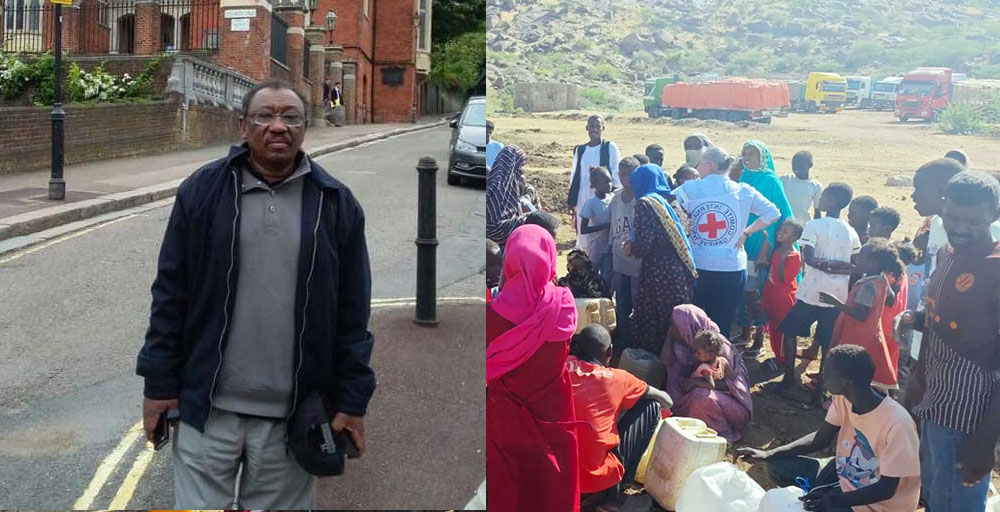
Interview with Expert Dr. Salah Al-Amin:’Moatinoon” Enters the Depths of International Humanitarian Work in Sudan
The humanitarian catastrophe facing civilians in Sudan has been exacerbated by the war that broke out on April 15, 2023, between the Sudanese Armed Forces and the Rapid Support Forces. This crisis has prompted international voices to demand that the warring parties protect civilians and allow humanitarian aid to reach those in need across Sudan and its regions.
In an interview with Dr. Salah Al-Amin, a Sudanese expert in international organizations and humanitarian work, Citizens delves into the nature of international humanitarian work in Sudan, its mechanisms, and how it is managed. Dr. Salah Al-Amin, a well-known figure in the field of humanitarian work, was born to Al-Amin Ahmed from Sennar and Khadija Abdul Karim from Al-Mujlad. He graduated from Zagazig University in Egypt and holds specialized certificates in humanitarian work from the American University in Cairo and Harvard University, in addition to a French language certificate from an institute in Nice, France. He has also participated in numerous specialized workshops in humanitarian work.
Dr. Al-Amin began his humanitarian career with the International Rescue Committee (IRC) in Eritrea and the border regions between Eritrea and Sudan during the eastern Sudan war. The IRC, founded by Albert Einstein in 1933, is an American organization that operates in conflict zones worldwide. Afterward, he briefly worked as an advisor with the Qatar Charity in Doha before joining the International Committee of the Red Cross (ICRC) in Geneva. The ICRC is the world’s oldest humanitarian organization, mandated to implement international humanitarian law to protect civilians and civilian facilities in war zones. Dr. Al-Amin worked in the ICRC’s aid department in some of the world’s most volatile areas, including Sri Lanka, Kashmir, Afghanistan, Yemen, Iraq, Mali, Nigeria, Kenya, and Somalia. He also worked briefly as a consultant for organizations such as Concern International and Islamic Relief. He now serves as an independent consultant in humanitarian work.
In your experience, why is the international community more focused on providing humanitarian support during conflicts rather than putting substantial effort into preventing crises or establishing ceasefires? Which should come first?
The international community’s focus on providing aid stems from the difficulty in securing ceasefires, as warring parties often resist adhering to them and believe they can achieve a military victory. Ceasefire negotiations are often very complex, while negotiations for humanitarian aid access are somewhat less complicated. Moreover, both sides wish to present themselves as compliant with international humanitarian law. The international community is historically committed to reaching civilians during wartime, recognizing that civilians are not parties to the conflict. This principle dates back to Henry Dunant, the ICRC’s founder, who initiated efforts to protect civilians and disarmed combatants.
Can effective humanitarian aid be provided to those affected by the war in Sudan amid ongoing military operations?
Yes, assistance and protection for civilians can be provided during the war in Sudan, as international humanitarian law guarantees this right. Historically, support has been provided to Sudanese civilians during the South Sudan war (Operation Lifeline Sudan, 1989-2005), the Nuba Mountains Agreement in Switzerland, and the Darfur war. Currently, similar aid is being delivered to civilians in Gaza and Lebanon.
You have previously mentioned the idea of a new lifeline operation similar to the South Sudan experience. Is such an initiative feasible in the current situation?
I continue to call for a lifeline operation, considering the changes and differences between the wars. The South Sudan war involved two main parties – the central government and the Sudan People’s Liberation Army – and was coordinated by the UN, with UNICEF as a neutral party, involving over 31 international humanitarian organizations. In the April 15 conflict, however, the entire country is affected, with multiple parties involved, each with allies. A well-coordinated and well-planned operation involving all stakeholders could establish another effective lifeline, especially given the local initiatives on the ground.
There has been talk about creating safe zones for civilians. How do you envision this being done, and what guarantees can ensure these zones remain safe in the absence of ceasefire agreements?
The safe zone proposal requires further study in workshops with experts in international humanitarian law (Sudanese and foreign). Some global experiences with safe zones have failed due to attacks from conflicting parties. Many international organizations now hesitate to establish and manage camps, as this could lead to the creation of new communities, potentially diverting people from returning to their original communities and shifting them from productive roles to dependency.
What mechanisms do international organizations use to provide humanitarian aid in Sudan’s current conditions?
Organizations partner with local communities within conflict zones, initiating forms of communication and support through mobile money transfers. These communities, through agreed-upon bodies, use the funds to purchase essential supplies. Aid is sometimes delivered via air drops, and temporary coordination with one or both parties allows limited access to certain areas for aid delivery.
The international community and organizations accuse the warring parties in Sudan of obstructing aid delivery. How accurate are these statements?
Yes, international organizations accuse both sides of obstructing aid, which indeed happens. Warring parties politicize humanitarian work, sometimes making it a security issue, and humanitarian assistance has been ethnically targeted, distributed only within specific support bases. Furthermore, corruption in aid distribution, seizure of aid for sale, and kidnapping of international workers have hindered humanitarian efforts.
Do international organizations seek to attract donors to fund their projects, and do crises represent a source of income and continuity for these organizations, or do they genuinely play a meaningful role during conflicts and crises?
Yes, international organizations seek funding to support humanitarian work, a benevolent activity not without interests here and there. There are also mutual interests in humanitarian work. However, if humanitarian work becomes entangled with politics, religion, ethnicity, or negative personal ambition, it ceases to be humanitarian.

